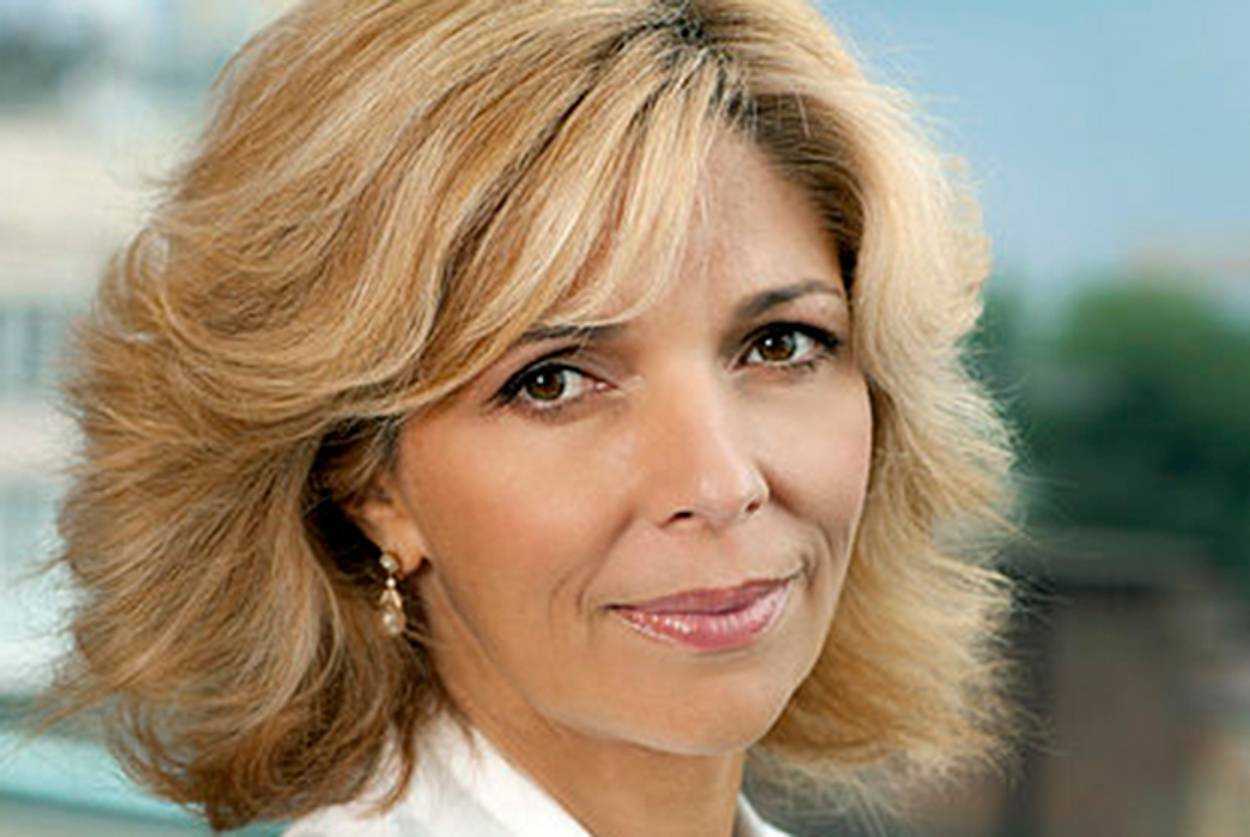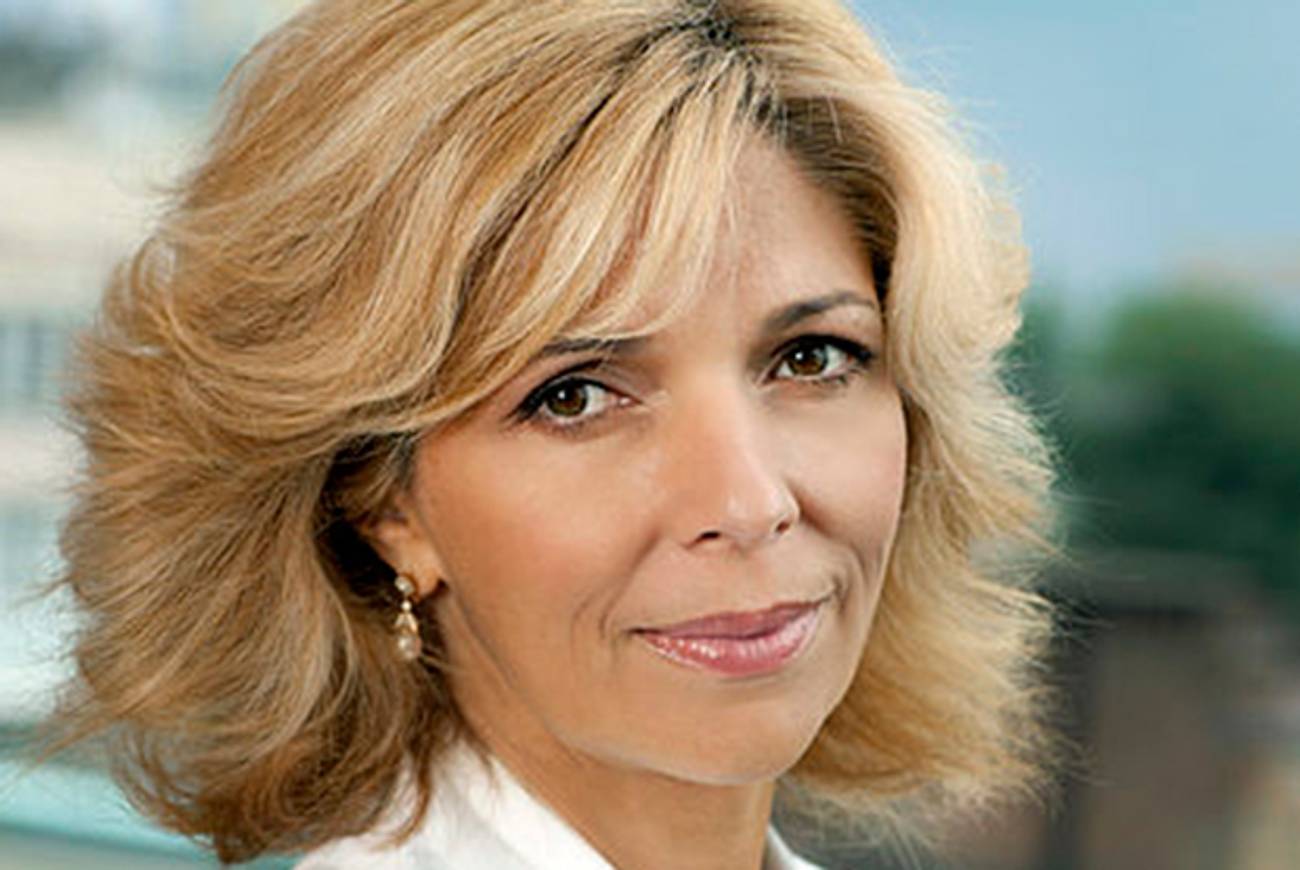Maidan’s Mother Teresa Talks Ukraine’s Future
Olga Bogomolets pushes for economic growth and a turn toward the E.U.




Ukrainian presidential candidate Olga Bogomolets is an aristocrat in every sense of that word, which is not an easy task in a post-Soviet society. A dermatologist, she is a sixth-generation M.D. and a professor who teaches at Kiev’s preeminent Bogomolets National Medical University. (The name is not a coincidence: The university was founded by her great grandfather.) She has published a lavishly illustrated two-volume history of her illustrious Russian Dvoryanin and Polish-Lithuanian gentry. Her family crest is emblazoned in gold foil on her business card.
Bogomolets became popularly known as the Mother Teresa of the Maidan for her ministrations to the wounded and the dying after the events of February 18 to 21. She is also, by any standard, a remarkable character. As a young woman she came to national prominence as a bard and singer of Ukrainian folk songs. She has also founded a collection of icons in a castle outside of Kiev.
The heroics of the Maidan failed to produce a viable new class of younger politicians. With the exception of Bogomolets, all major candidates in this Sunday’s presidential elections have either held ministerial positions, the presidency itself, or are holdovers from previous administrations. Bogomolets, on the other hand, is about to form her own political party.
Several days ago, I met with Bogomolets in the evening in her spare campaign office in Kiev, to talk about her candidacy, the challenges of revolution, and the future of Ukraine.
You became famous during the Maidan protests.
I did not become famous, but perhaps I did become better known in the West and to Europeans. Ukrainians have known me for a long time, since I was a national bard and troubadour for the last 20 years.
I have been involved in many national and Pan-Ukrainian projects, including a health marathon, Melanoma awareness day, and worked on creating a system of universal check-ups for all the country’s orphans. I have also visited every woman’s prison in this country with the goal of eradicating tuberculosis in prison. After Maidan I became better known in the west partly for my efforts to gather support for an investigation into the [Maidan] massacre, a genocide against the Ukrainian people that took place in the middle of Europe, by sniper fire. I turned to the media in many places to plead for help, as this sort of thing should not happen in Europe in the 21st century. It is the fault of our politicians that peaceful protesters who were merely fighting against corruption were massacred.
You and several other Ukrainian organizations have demanded an investigation of those events, the sustained sniper fire into the crowd, but as of now has there been any result?
On the 20th of February I was one of the coordinators of the Maidan’s medical service. We had more than a thousand volunteers working around the clock, and all of those people risked both their lives and their health because they could have been hit with a bullet at any given moment. Immediately after the 20th I called for an independent investigation, by experts, on the logistics of the question of who the shooters were and what sort of weapons they were firing with. People died on both sides of the barricades by the way.
You were there that day treating the wounded. People died in your arms?
Yes. On the 18th, when the Berkut beat the peaceful demonstrators indiscriminately we had 1,500 wounded, and of those 400 were heavily wounded and 12 killed. On the 20th when they opened fired we had 1,300 wounded and 46 killed, if I remember correctly. Over the course of three hours at the Hotel Ukraina, we had 13 wounded people die in the makeshift operating hall, one after the other. The sorts of wounds that had been inflicted by professional snipers, to the heart, to the head and to the carotid artery in the neck were untreatable. Dozens of people were shot directly through the eye.
Why are you running for President of Ukraine?
My decision to become a presidential candidate was taken after I was given a petition signed by 7,000 people from the Maidan. People told me that they would have no one to vote for. The Maidan appeared first and foremost out of feelings of frustration with corruption, not even the European integration protests that instigated everything. The student protesters were beaten and dispersed, after which a million people came out into the streets.
What is your political platform?
The most important thing is to change the political system, so that people can come to power without money. Under the current system, all members of the government are either oligarchs, work for oligarchs or have been appointed by those same oligarchs. Today, if you do not serve one of the oligarchic clans you simply can’t get into politics. Once people get into politics through, under the current system they are forced to work off the investment of the oligarch who backed them and to serve his interests. This is a form of the highest corruption. I am demonstrating my commitment to clean government by having an entirely volunteer run campaign. There is no oligarchic power standing behind us. We do not have a big budget, and we subsist entirely on donations.
Basically, we are at this moment living under a government run by bandits, with corruption endemic at every level of government. There is no uncorrupted sphere in Ukraine today, neither in the government nor civil spheres. Our mission then is to transform a government of bandits into a government that serves the people through the creation of mechanisms of economic transparency. We need to show that people from the professions can come to power rather than oligarchs.
We also need to bring in European style ways of operating, best practices, without reinventing the bicycle. This has been done in Georgia and Poland and we need to do the same thing that they have done.
What are the obstacles that are in your path?
There are complex internal conflicts between the oligarch clans, that is intra-clan warfare for power. And it is very difficult for a person who is not involved with one of these clans to get elected or get access to power. The people who hold power are very adept at keeping new people out through the usage of technical procedures and propaganda. They will shower you with dirt and spread misinformation. For example, they have spread the lie that I am only a ‘technical candidate’ about me.
What do they mean by “technical candidate”?
A technical candidate is a candidate who is running for the sole purpose of giving another candidate an edge in the vote count by diluting the number of electoral observers that a given candidate has access to. Every candidate gets one observer in the room when the votes are being tallied. Ukraine has a problem with voter fraud and falsification and so when the votes are being counted, having extra observers in the room is very important.
Some presidential candidates make deals with major candidates and so become ‘technical candidates’ for whom people will not vote. So my opponents have been spreading the slander that I am a technical candidate.
What is your party ideological line?
Ukraine today does not have a political party today that represents the interests of all regions. Political parties represent regional interests. What is needed is a countrywide centrist party, based on constitutional, democratic and centrist principles. Ukraine needs a peaceful political program, apolitically neutral modernization along a European vector of development. We need to have peace with all countries, and this mean good external politics, which flows out of good internal politics. We need to upgrade the agricultural sector. Ukraine has colossal agricultural and green energy potential. We need to develop tourism.
Do you consider yourself ‘Socialist’ or ‘Social democratic’ or center left by European standards? It sounds like you are coming from those sorts of impulses.
I believe in the European welfare-state-type policies but I would not call myself ‘Socialist’ as that is a dirty word here in Ukraine. Those parties have discredited themselves by being corrupt while using that word. While calling for free education and universal health care they have nether less behaved in same fashion as the other parties have. Like everyone else. So people do not have, unfortunately, much faith in parties using that word.
As a doctor you must have very specific ideas about reforming the health care system.
I have a civil platform for completely overhauling the system called Ukraina 80+. Our primary goal is to increase life expectancy in the Ukraine from the average of 65 (58 in Eastern Ukraine) to the European average of 80. So the European policy proscription of raising the retirement age in Ukraine to the international standard of 65 is a painful question for us. A significant portion of the male population does not live to retirement age as it is, so the population gets understandably irritated by proposals to raise the retirement age to 65. We would be happy to raise it to 65, but only when our average life expectancy rises closer to 80, like it is in the rest of Europe.
What will be the most pressing issue after Sunday’s elections?
We will need to schedule parliamentary elections as quickly as possible. Parliament today has no popular political legitimacy and we have members of parliament with blood on their hands.
What we also need now is economic growth. Without it we will have continuous revolutions. The average monthly salary is 200 to 300 dollars a month. The average pension is about 70 a month. It is very difficult to live on that sort of income. With that sort of income, people can’t even afford to pay for medicine that the government does not supply them. So the revolution that took place in Kiev is one of conscience. The one taking place in Eastern Ukraine springs out of poverty and inhumane living conditions. People are protesting against the poverty that does not let them live whole and meaningful lives.
Related: The Head of the Jewish Community of Ukraine Speaks Out Against Putin
After Yanukovych, Maidan’s Next Fight Will Be To Preserve a Ukraine Safe for Minorities
Vladislav Davidzon is Tablet’s European culture correspondent and a Ukrainian-American writer, translator, and critic. He is the Chief Editor of The Odessa Review and a Non-Resident Fellow at the Atlantic Council. He was born in Tashkent, Uzbekistan, and lives in Paris.